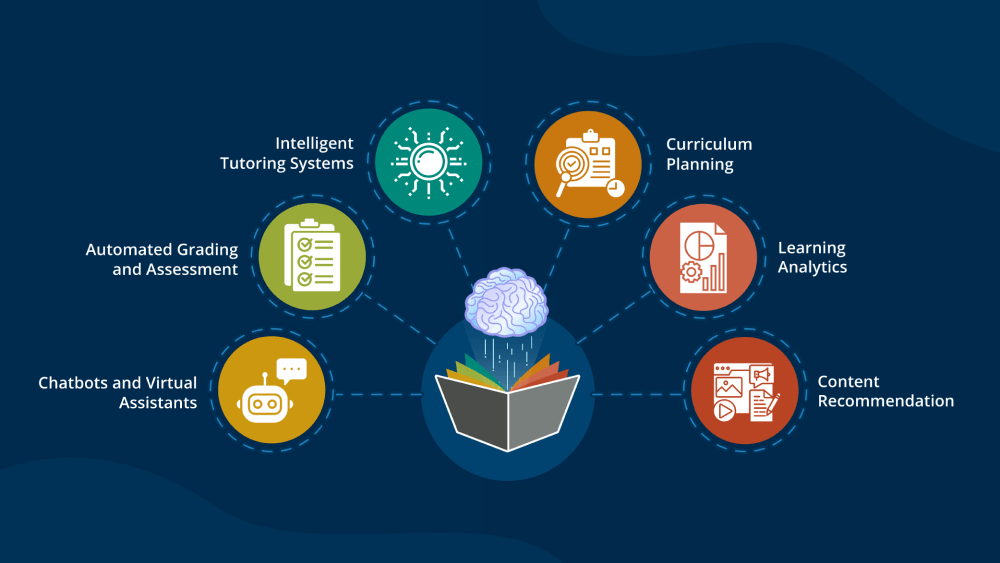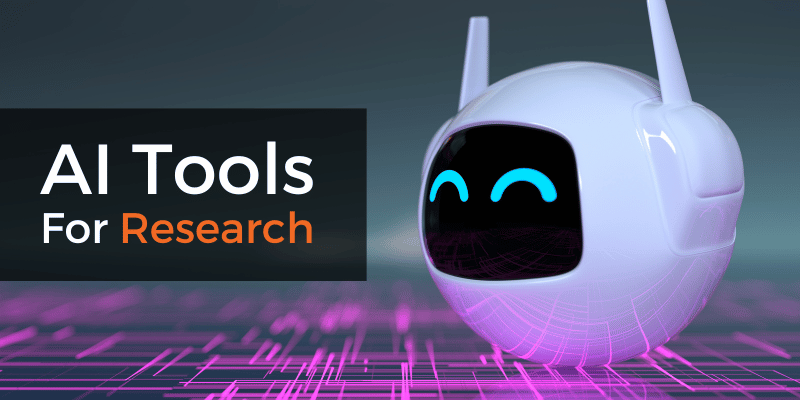Artificial Intelligence (AI) has revolutionized many fields, and research is no exception.
Whether you’re a student, a professional researcher, or just someone curious about a particular topic, AI tools can help you find, organize, and analyze information more efficiently.
Let’s explore some of the most useful AI tools for research and how they can make your life easier.
1. AI-Powered Search Engines
Google Scholar: This specialized search engine is tailored for academic research.
It uses AI to help you find scholarly articles, theses, books, and conference papers across various disciplines. You can filter results by date, author, or publication and even set up alerts for new papers on your topic of interest.
Semantic Scholar: Developed by the Allen Institute for AI, Semantic Scholar goes beyond simple keyword searches. It uses machine learning to understand the context of your query, offering more relevant results and highlighting influential papers in your field.
2. Literature Review and Summarization Tools
Research Rabbit: This AI tool helps you build and explore research paper collections. By analyzing your existing references, it recommends related papers and visualizes the connections between them, making it easier to spot trends and gaps in the literature.
SciSummary: Reading and summarizing lengthy research papers can be time-consuming. SciSummary uses AI to generate concise summaries of academic papers, highlighting key points, methodologies, and findings. This can save you hours of reading time.
3. Data Analysis and Visualization Tools
IBM Watson Analytics: This powerful tool leverages AI to help you analyze data without needing advanced statistical knowledge. You can upload your data, and Watson will provide insights, trends, and visualizations to help you understand and present your findings.
Tableau: While not exclusively an AI tool, Tableau incorporates AI-driven features like natural language processing (NLP) to make data visualization more intuitive. You can ask questions in plain English, and Tableau will generate relevant visualizations and insights.
4. Writing and Proofreading Assistance
Grammarly: This popular AI tool goes beyond simple grammar checks. It provides suggestions for clarity, engagement, and delivery, ensuring your writing is not only correct but also compelling and easy to read.
QuillBot: Struggling with writer’s block or need to paraphrase a passage? QuillBot uses AI to help you rephrase sentences while maintaining the original meaning. It’s a great tool for improving the readability and uniqueness of your text.
5. AI Tools for research – Citation and Reference Management
Zotero: This free, open-source tool helps you collect, organize, cite, and share your research sources. Its AI-driven features automatically extract citation details from websites and research papers, making it easy to build and manage your bibliography.
Mendeley: Mendeley combines reference management with social networking. It suggests relevant papers based on your research interests and allows you to collaborate with other researchers. Its AI features help keep your references organized and accessible.
6. Plagiarism Detection
Turnitin: Widely used in academic institutions, Turnitin employs AI to detect potential plagiarism in your work. It compares your text against a vast database of academic publications, ensuring originality and helping maintain academic integrity.
Unlocking Creativity: The Primary Advantage of Generative AI in Content Creation
Generative Artificial Intelligence (AI) is revolutionizing content creation by offering a unique advantage: the ability to inspire and augment human creativity. Let’s delve into why this is the primary advantage of using generative AI in content creation, especially in today’s digital age.
What is Generative AI?
Generative AI refers to AI systems capable of creating new content, such as images, text, music, and even videos, based on patterns and data they’ve been trained on. Unlike traditional AI, which follows pre-defined rules, generative AI can generate novel and diverse outputs, often mimicking human-like creativity.

Advantages of Generative AI in Content Creation
The Advantages of Generative AI in Content Creation:
- Unleashing Creativity: Generative AI serves as a catalyst for human creativity. By generating ideas, concepts, and content variations, it inspires creators to explore new avenues and break through creative blocks.
- Efficiency and Scale: With generative AI, content creation becomes more efficient and scalable. AI algorithms can generate vast amounts of content in a short time, freeing up human creators to focus on higher-level tasks such as ideation and storytelling.
- Personalization: Generative AI enables personalized content creation at scale. By analyzing user preferences and data, AI systems can generate content tailored to individual tastes, enhancing user engagement and satisfaction.
- Enhanced Collaboration: Generative AI promotes collaboration between humans and machines. Creators can leverage AI-generated content as a starting point, iterate on ideas, and collaborate with AI systems to refine and improve the final output.
- Consistency and Quality: AI-driven content creation ensures consistency and quality across various media formats. AI algorithms can adhere to style guidelines, grammar rules, and brand aesthetics, maintaining a high standard of content quality.
Practical Applications of Generative AI in Content Creation:
- Writing and Copywriting: Generative AI can assist writers by generating article outlines, brainstorming ideas, and even producing draft content that writers can further refine.
- Design and Visual Content: AI-powered tools can create visual designs, illustrations, and graphics based on user inputs, streamlining the design process and enhancing visual storytelling.
- Music and Audio Generation: Generative AI can compose music tracks, generate sound effects, and even create personalized playlists based on user preferences and mood.
- Video and Animation: AI algorithms can generate video animations, special effects, and dynamic content based on scripts or user instructions, making video production more accessible and efficient.
- Content Personalization: AI-driven recommendation engines can personalize content recommendations, product suggestions, and marketing campaigns based on user behavior and historical data.
Embracing Generative AI in Content Creation:
To harness the advantages of generative AI in content creation, creators can:
- Explore AI Tools: Familiarize yourself with AI-powered tools and platforms that offer generative capabilities, such as text generators, design tools, and music composition software.
- Experiment and Iterate: Experiment with AI-generated content, iterate on ideas, and collaborate with AI systems to refine the creative process and achieve desired outcomes.
- Balance Human Touch: While leveraging generative AI, maintain a balance between automation and human creativity. Utilize AI as a means to boost creativity instead of entirely substituting it.
- Stay Updated: Keep abreast of advancements in generative AI technology, new tools, and best practices in content creation to continuously improve your creative workflows.
Unlocking Learning: How AI Tools Empower Students
In today’s digital age, Artificial Intelligence (AI) is not just a futuristic concept but a practical reality that is transforming the way students learn and excel in their academic journeys. AI tools are becoming increasingly accessible and user-friendly, offering a plethora of benefits to students of all ages and disciplines. Let’s delve into how AI tools are revolutionizing education and empowering students to reach new heights of success.

Personalized Learning Experience
One of the most significant advantages of AI tools for students is their ability to personalize the learning experience. Traditional education often follows a one-size-fits-all approach, but AI can adapt to individual student needs. For example, AI-powered tutoring platforms can assess a student’s strengths and weaknesses, then tailor lessons and practice activities accordingly. This personalized approach not only enhances understanding but also boosts confidence and motivation.
Enhanced Study Efficiency
AI tools streamline the process of studying and researching, saving students valuable time and effort. Advanced search algorithms help students find relevant information quickly, whether they’re working on a school project or preparing for an exam. AI-powered note-taking apps can organize and summarize lecture materials, making revision more manageable. Additionally, AI-driven plagiarism checkers ensure academic integrity by detecting and highlighting any unintentional similarities in students’ work.
Interactive Learning Resources
Gone are the days of static textbooks and blackboard lectures. AI tools bring interactivity and engagement to the learning process. For instance, educational apps and platforms use AI to create interactive simulations and virtual experiments, allowing students to explore complex concepts in a hands-on manner. Chatbots equipped with natural language processing (NLP) capabilities can answer students’ questions in real-time, providing immediate support and clarification.
Adaptive Assessment and Feedback
Traditional exams often fail to capture the full spectrum of students’ abilities. AI-powered assessment tools offer a more comprehensive evaluation by analyzing not just final answers but also the problem-solving process. These tools can generate adaptive quizzes that adjust difficulty based on student performance, ensuring a challenging yet manageable learning curve. Furthermore, AI-driven feedback mechanisms provide constructive suggestions for improvement, fostering continuous learning and growth.
Collaboration and Communication
AI tools facilitate seamless collaboration among students and with educators. Virtual classrooms equipped with AI features enable real-time collaboration on group projects, regardless of geographical locations. AI-powered language translation tools break down language barriers, allowing students from diverse backgrounds to communicate effectively. Moreover, AI-driven analytics track students’ progress and participation, providing valuable insights for educators to tailor their teaching strategies.
Ethical Considerations and Future Outlook
While AI offers immense potential for educational enhancement, it also raises ethical considerations regarding data privacy, bias mitigation, and equitable access. It’s crucial for educators, policymakers, and technology developers to collaborate in creating responsible AI tools that prioritize students’ well-being and uphold ethical standards.
Looking into the future, AI’s role in education holds great promise. As technology continues to evolve, AI tools will become even more sophisticated, catering to diverse learning styles and needs. By embracing these advancements responsibly, students can harness the full benefits of AI and embark on a transformative learning journey that prepares them for success in the ever-evolving digital world.
Exploring AI Websites for Students
Artificial Intelligence (AI) is a fascinating field that’s making waves across various industries, and it’s also becoming more accessible to students through AI-powered websites. These websites are designed to help students learn, explore, and engage with AI in fun and educational ways. Let’s dive into what AI websites for students are all about.
What are AI Websites for Students?
AI websites for students are online platforms or tools that use AI technology to offer educational content, interactive experiences, and resources related to artificial intelligence. These websites are designed to cater to students of different age groups and knowledge levels, from beginners to advanced learners.
How Do AI Websites Help Students?
- Learning AI Basics: Many AI websites provide easy-to-understand explanations and tutorials on fundamental AI concepts. This includes topics like machine learning, neural networks, and natural language processing. Students can grasp these concepts through interactive lessons, videos, and quizzes.
- Hands-on Coding: For students interested in coding and programming, AI websites often offer coding environments where they can practice writing AI algorithms. These platforms may support popular programming languages like Python and provide step-by-step guidance on creating AI models.
- AI Projects and Challenges: Advanced AI websites present students with real-world projects and challenges. These could involve building chatbots, image recognition systems, or recommendation engines. By working on such projects, students gain practical AI skills and problem-solving abilities.
- Community and Collaboration: Some AI websites foster a community where students can connect with peers, share ideas, and collaborate on AI projects. This collaborative environment encourages teamwork and allows students to learn from each other’s experiences.
- AI Ethics and Implications: As AI becomes more pervasive, understanding its ethical implications is crucial. Certain AI websites cover topics like bias in AI, data privacy, and the societal impact of AI technologies. These discussions help students develop a well-rounded perspective on AI.
Examples of AI Websites for Students
- Codecademy: Offers interactive AI courses covering machine learning, deep learning, and AI ethics. Students can practice coding in Python and TensorFlow while building AI projects.
- Kaggle: Where data science and ML enthusiasts converge Students can participate in AI competitions, access datasets, and collaborate with a global community of AI practitioners.
- Google AI Education: Provides resources such as AI guides, workshops, and educational videos for students interested in AI research and development.
- OpenAI Gym: An open-source platform for reinforcement learning research. Students can experiment with AI algorithms in simulated environments like games and robotics.
- AI4ALL Online: Offers AI education programs specifically designed for high school students, focusing on AI fundamentals and applications in various domains.
Getting Started with AI Websites
To get started with AI websites as a student:
- Identify Your Interests: Determine which aspects of AI intrigue you the most, such as machine learning, robotics, or AI ethics.
- Explore Learning Paths: Choose an AI website that aligns with your interests and offers structured learning paths or courses.
- Practice Regularly: Engage consistently with AI tutorials, coding exercises, and projects to reinforce your understanding and skills.
- Join Communities: Connect with other students and AI enthusiasts through forums, social media groups, or collaborative platforms offered by AI websites.
- Stay Curious: AI is a rapidly evolving field, so stay curious and keep exploring new AI concepts, technologies, and applications.
Benefits of AI Websites for Students:
- Accessible Learning: AI websites break down complex AI concepts into digestible chunks, making it easier for students to grasp foundational knowledge without feeling overwhelmed.
- Interactive Learning: Many AI websites use interactive elements such as quizzes, simulations, and games to engage students actively. This interactive approach enhances retention and understanding.
- Personalized Learning Paths: Some AI websites utilize AI algorithms themselves to personalize learning paths based on a student’s progress and areas of interest. This adaptive learning approach ensures that students receive tailored educational experiences.
- Real-world Applications: By working on AI projects and challenges offered by these websites, students gain practical experience and can showcase their skills to potential employers or academic institutions.
- Career Readiness: As AI continues to influence various industries, students who engage with AI websites develop skills that are highly relevant in today’s job market. This includes data analysis, programming, problem-solving, and critical thinking.

Practical Applications of AI Websites for Students:
- AI in Education: AI-powered educational platforms can analyze students’ learning patterns and provide personalized recommendations for improvement. These platforms can also automate administrative tasks for educators, allowing them to focus more on teaching.
- AI in Healthcare: Students can explore AI applications in healthcare, such as medical image analysis, disease diagnosis, and personalized treatment recommendations. AI websites may offer simulations or case studies in this domain.
- AI in Robotics: Students interested in robotics can learn about AI algorithms used in robotic systems, such as computer vision for object recognition or reinforcement learning for autonomous decision-making.
- AI in Business: AI websites often cover AI applications in business, such as predictive analytics, natural language processing for customer service, and recommendation systems for marketing.
- AI Ethics and Governance: Understanding the ethical implications of AI is crucial. AI websites may provide resources and discussions on topics like bias in AI algorithms, responsible AI deployment, and regulatory frameworks.
Tips for Maximizing Your AI Learning Experience:
- Set Goals: Define clear learning goals and objectives before diving into AI websites. This will keep you on track and inspired during your learning adventure.
- Stay Consistent: Allocate regular time slots for learning AI concepts and practicing coding exercises. Consistency is key to building a strong foundation in AI.
- Seek Feedback: Don’t hesitate to seek feedback from peers, mentors, or online communities. Constructive feedback can help you improve your AI skills and projects.
- Experiment and Explore: AI is a vast field with numerous applications. Take the opportunity to experiment with different AI tools, libraries, and projects to broaden your understanding.
- Stay Updated: Keep yourself updated with the latest trends, research, and advancements in AI by following reputable AI news sources, blogs, and publications.
By leveraging AI websites effectively, students can acquire valuable skills, gain practical experience, and prepare themselves for exciting opportunities in the ever-evolving field of artificial intelligence.
Conclusion
AI tools are transforming the research landscape, making it easier to find relevant information, analyze data, and present your findings. By incorporating these tools into your workflow, you can save time, enhance the quality of your research, and stay ahead in your field. Whether you’re conducting a literature review, writing a paper, or analyzing complex data, there’s likely an AI tool that can help you streamline the process and achieve better results.


